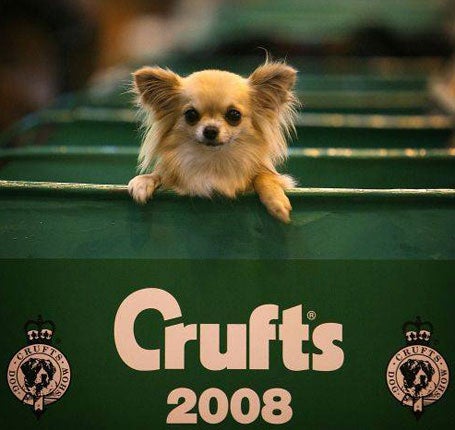Crisis in the kennel: Is Crufts cruel?
The RSPCA has unleashed controversy with claims that pedigree breeding programmes can leave animals deformed. So is Crufts cruel?

Your support helps us to tell the story
From reproductive rights to climate change to Big Tech, The Independent is on the ground when the story is developing. Whether it's investigating the financials of Elon Musk's pro-Trump PAC or producing our latest documentary, 'The A Word', which shines a light on the American women fighting for reproductive rights, we know how important it is to parse out the facts from the messaging.
At such a critical moment in US history, we need reporters on the ground. Your donation allows us to keep sending journalists to speak to both sides of the story.
The Independent is trusted by Americans across the entire political spectrum. And unlike many other quality news outlets, we choose not to lock Americans out of our reporting and analysis with paywalls. We believe quality journalism should be available to everyone, paid for by those who can afford it.
Your support makes all the difference. YES
Mark Evans, Chief veterinary adviser, RSPCA
"Many characteristics which are considered desirable in pedigree dogs – as defined by the breed standards which the Kennel Club promotes – are actually shocking deformities which affect the welfare and quality of life for hundreds of thousands of dogs.
Shows such as Crufts, which are judged according to these standards, are actively encouraging selective breeding for appearance rather than for health, welfare and temperament. As the show tries to get aesthetic perfection, the inbreeding of related dogs is promoted, even though this might result in the increased likelihood of passing disability and disease between generations.
There are now recognised to be more than 450 inherited diseases suffered by pedigree dogs and we believe the intentional breeding of deformed dogs and close inbreeding is morally unjustifiable and must stop.
Anatomical as well as welfare problems are perhaps most obvious in dogs bred to have excessively flat faces, such as bulldogs, pugs and Pekingese. Many of these dogs may struggle to breathe and may have difficulty even controlling their body temperature because they are unable to pant properly.
Another example is those breeds intentionally bred to have excessive amounts of folded, wrinkled skin (such as the basset hound and Neapolitan mastiff), which predisposes them to eye problems, skin infections and problems communicating.
The extent of inbreeding is extremely worrying. Currently, the Kennel Club's rules only allow breeding between pedigree dogs already registered with them, and of the same breed. This restricts the gene pool for each breed and increases the risk of inherited diseases. A study by Imperial College London earlier this year discovered that since the 1970s, just one English springer spaniel has more than 2,500 descendants. Only 5 per cent of all male golden retrievers have been chosen by breeders, because of their competition-winning qualities, such as a fine coat, to breed in the UK over the same period. This also reduces the available gene pool.
The RSPCA's aim is that every pedigree dog should be born with the best possible chance of enjoying a healthy, happy life. As things stand, the odds are stacked against this. All of us who benefit from pedigree dogs have a responsibility to solve what is now a very serious and totally unnecessary animal-welfare problem."
NO
Caroline Kisko, Secretary, Kennel Club
"Together with the help of breeders, we're working extremely hard to improve the health of pedigree dogs.
For example, in the bulldogs at Crufts, we look for a smooth coat, and a head that is fairly large in proportion to the dog's overall size. While the face should be short with a broad muzzle, dogs showing respiratory distress are considered highly undesirable. This is a change we have introduced over the last five years.
The RSPCA's decision to pull out of Crufts came after a documentary was broadcast on the BBC last month [BBC1's Pedigree Dogs Exposed], which we feel was highly biased against us. We're making a complaint about the programme to [the broadcasting regulator] Ofcom and are reviewing our position with regards to the BBC televising the show.
The programme failed to mention the changes we're making towards improving animal welfare; specifically standards such as the one outlined towards bulldogs. Additionally, we've loosened the restrictions for Pekinese dogs specifying a flatter face.
With living animals, there is no quick fix. Change is generational, and each generation takes about five years to get to breeding age. Judges should judge with the health of the animals at the front of their mind. They cannot reward dogs that they perceive to be unhealthy in any situation.
The Kennel Club also has a charitable trust and is putting money into DNA testing that can help our members to identify bad genes in their dogs. It's something we can only provide for certain breeds at the moment because the genes for different diseases change between dogs, but over time we will be able to broaden it out. This is a vast improvement; previously, detection of genetic defects in dogs had been based on guesswork and breeder knowledge. The RSPCA has a perspective problem.
We accept that things such as epilepsy will affect the quality of a dog's life. But there are other health issues that are relatively unimportant – the same goes for the human population.
Sadly, you will never have a situation where every dog is healthy. There will always be an element of the population that cannot achieve perfection."
Join our commenting forum
Join thought-provoking conversations, follow other Independent readers and see their replies
Comments